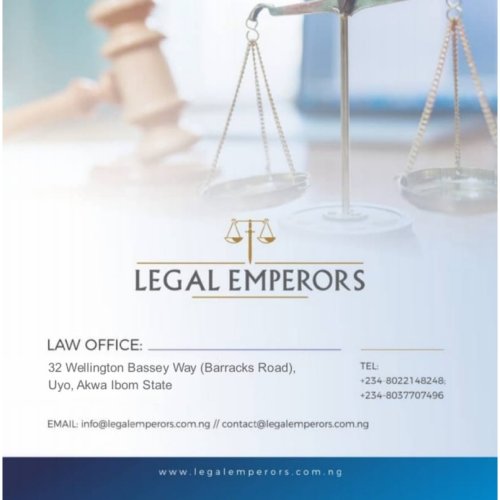Best Retirement Lawyers in Uyo
Share your needs with us, get contacted by law firms.
Free. Takes 2 min.
List of the best lawyers in Uyo, Nigeria
About Retirement Law in Uyo, Nigeria
Retirement in Uyo, Nigeria, involves a range of legal and administrative processes tailored to ensuring that citizens can enjoy financial security in their post-employment years. The legal framework governs how pension plans are structured, the retirement age, the management of retirement savings, and the disbursement of benefits. The National Pension Commission (PenCom) is responsible for overseeing pensions in Nigeria, working to ensure a regulated and efficient retirement savings system for all employed Nigerians, including those in Uyo.
Why You May Need a Lawyer
Legal assistance may be sought in several scenarios relating to retirement. Individuals may require a lawyer to help interpret and navigate pension schemes or to address disputes with employers over retirement benefits. Lawyers can also provide guidance in estate planning, ensuring that retirement assets are well-managed and allocated according to one's wishes. Additionally, those dealing with pension fund mismanagement or seeking to ensure compliance with local retirement laws may benefit from legal expertise.
Local Laws Overview
In Uyo, as in the rest of Nigeria, retirement laws are primarily governed by the Pension Reform Act, which mandates that employers and employees contribute towards a retirement savings account. The act sets the minimum contributions, establishes the framework for Retirement Savings Accounts (RSAs), and allows for the selection of Pension Fund Administrators (PFAs). It also outlines the rights of retirees to access their savings and outlines protections against fund mismanagement.
Frequently Asked Questions
What is the official retirement age in Nigeria?
The official retirement age for public sector employees in Nigeria is 60 years or after 35 years of service, whichever comes first. The private sector may have its specified retirement ages, generally aligning with company policies.
How are pension schemes regulated?
All pension schemes in Nigeria are regulated by the National Pension Commission (PenCom), which ensures compliance with the Pension Reform Act and safeguards pension funds.
What happens to my pension if I change jobs?
Your Retirement Savings Account (RSA) is portable, meaning you can transfer it when you change jobs without losing your accumulated benefits.
Can I access my retirement savings before the official retirement age?
Under certain conditions, such as being out of work for at least four months, you might be eligible to access a portion of your RSA, typically up to 25% of the balance.
What is the role of a Pension Fund Administrator (PFA)?
A PFA manages your RSA, ensuring contributions are collected, invested, and benefits are disbursed according to regulations.
How do I choose a Pension Fund Administrator (PFA)?
You can select a PFA based on their service record, investment options, fee structures, and customer service reputation. It's important to conduct thorough research and possibly consult with a financial advisor.
Are pensions subject to taxation in Nigeria?
Pension benefits are generally not taxed; however, voluntary contributions not left in the account for a specified minimum period may be subject to tax.
Can I have multiple pension accounts?
No, each person is entitled to one Retirement Savings Account (RSA) throughout their career life to prevent fund mismanagement and ensure consolidated savings.
How can I resolve disputes with my PFA?
Disputes can be addressed through the grievance redressal mechanism provided by the PFA or escalated to the National Pension Commission (PenCom) if not resolved at the PFA level.
What happens to my pension when I pass away?
Your pension typically goes to your designated beneficiaries or to your estate, as outlined in your will and stipulations you provide to your PFA.
Additional Resources
Those seeking further information or assistance can contact the National Pension Commission (PenCom), which provides comprehensive resources and guidance on pension-related matters. Additionally, the Akwa Ibom State Ministry of Finance may offer localized support. Non-governmental organizations focused on retirees and pensioners, such as the Nigeria Union of Pensioners, might also provide valuable support and advocacy.
Next Steps
If you need legal assistance related to retirement, consider consulting a lawyer specializing in pension law in Uyo. Begin by gathering all relevant documents, including any communication with your employer or PFA. Seek recommendations for qualified lawyers and schedule consultations to discuss your situation. Legal clinics or the Nigerian Bar Association in Uyo may also direct you to lawyers who could assist on a pro-bono basis if necessary.
Lawzana helps you find the best lawyers and law firms in Uyo through a curated and pre-screened list of qualified legal professionals. Our platform offers rankings and detailed profiles of attorneys and law firms, allowing you to compare based on practice areas, including Retirement, experience, and client feedback.
Each profile includes a description of the firm's areas of practice, client reviews, team members and partners, year of establishment, spoken languages, office locations, contact information, social media presence, and any published articles or resources. Most firms on our platform speak English and are experienced in both local and international legal matters.
Get a quote from top-rated law firms in Uyo, Nigeria — quickly, securely, and without unnecessary hassle.
Disclaimer:
The information provided on this page is for general informational purposes only and does not constitute legal advice. While we strive to ensure the accuracy and relevance of the content, legal information may change over time, and interpretations of the law can vary. You should always consult with a qualified legal professional for advice specific to your situation.
We disclaim all liability for actions taken or not taken based on the content of this page. If you believe any information is incorrect or outdated, please contact us, and we will review and update it where appropriate.








